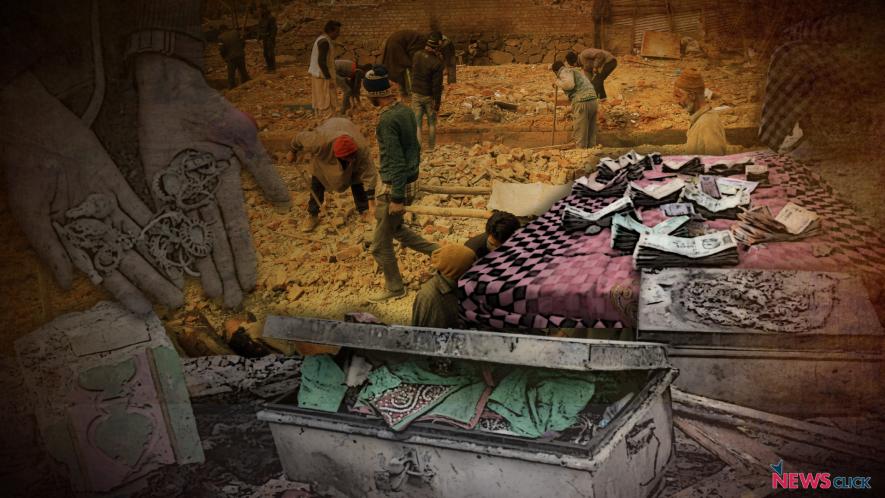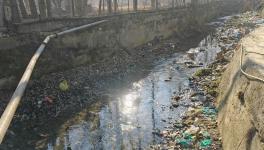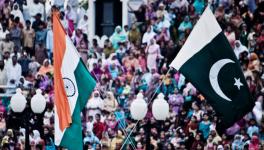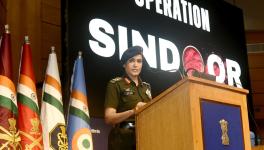In Kashmir’s Mujgund, Families Brave the Cold After 7 Houses Turn Into Ashes After Encounter

Images Courtesy: Zubair Sofi
On December 8, 2018, a gunfight broke out between militants and government forces in Mujgund area situated on the outskirts of Srinagar – the summer capital of Jammu and Kashmir. In the gunfight, three militants and one Indian army personnel were reportedly killed. One among the three militants was a 17-year-old boy. He was known to have played a part in the Hindi film, Haider.
After the gunfight, seven houses from the area were turned into ashes, forcing the affected families on the roads in the freezing temperature.
Over the years, government forces have destroyed hundreds of houses in Kashmir to kill suspected militants.
A similar destruction took place on December 8, when the forces laid siege on Fishermen Colony in Mujgund, located on the Srinagar-Bandipora highway. This colony constitutes 13 households situated on the bank of river Jhelum.
The operation took place following a tip-off about the presence of militants in the area.
On that day, at around 4:45 pm, Jahangir Ashraf Mir, a 15-year-old boy, was sitting in the corner of his kitchen, fidgeting with his phone, waiting for his mother, Muzamila, to finish preparing tea.
Muzamila, who is in her late thirties, went out to get biscuits for her son, holding the hands of her five-year-old old daughter, Alfa. While returning from the shop, she noticed army personnel conducting a door-to-door search.
“I moved a little fast, as my son was sitting alone at home. As soon as I entered my kitchen, three men with rifles, wearing phiran (a long gown worn by people in Kashmir during winters) jumped in from the window,” said Muzamila.
One among them, who was wearing a chequered phiran, told Muzamila, “Mouji Tuih Neriv Neiabar.” (Mother, please leave the house). Holding Alfa in her arms, a scared Muzamila rushed out barefoot.
Jahangir was still inside, and the three armed men asked him to go out as well. Before he went out, they asked him for a mug of water. “I handed over a mug to them, and rushed out,” he said.
As he stepped out, Jahangir found his house surrounded by government forces with guns pointed towards his one-storeyed house. Before he could move his head, one of the troopers asked him to go inside with them. “They were trying to use me as human shield, but I resisted,” says young Jahangir.
He had to pay a price for saying ‘no’ to them. A number of troopers allegedly hit him with canes, kicked, and slapped him, as a helpless Muzamila watched from a distance.
“I ran towards him, but a group of troopers stopped me, and started hitting me too with canes. I backed off to save my daughter from caning,” said Muzamila. The troopers dragged Jahangir, and threw him inside their armed vehicle. Within 10 minutes of this, there was exchange of fire.
Earlier, the forces had searched all the houses and left. But they reportedly came back, and asked everyone living near Jahangir’s house to leave. Following this, everyone was running to save their lives, leaving everything behind. They reached a village nearby where people provided them refuge.
With every bang of gunshot, Muzamila’s heart beat faster, as her son was still near the site.
The gunfight continued till next day. During the whole operation, the personnel used explosives to kill the militants, such as mortars and IED.
On December 9, at around 11:30 a.m, the exchange of fire stopped. The residents rushed to the spot to examine their houses but were shattered and broke into tears when they saw their abodes razed to the ground.
The forces had left the spot, carrying the three dead bodies of militants.
The residents said all they was smoke emerging from every corner of the seven houses that had been turned into ashes. Their entire life savings had turned into ruins.
Jahangir was sitting near the debris of his house, sobbing. When Muzamila reached closer, she found her son wounded and their newly constructed house demolished.
“We collected money for years to make a house, saved every penny to fill it with the required belongings. Everything is destroyed now. I feel like my whole life is shattered,” said Muzamila.
Not only have the houses been destroyed, even the lives of the families are hanging by a thread, for no fault of theirs. Ghulam Rasool Kachru, 50, who lives next to Jahangir’s house, spoke about how the destruction of his house has ruined the lives of his three daughters and two sons.
Rasool would work hard and dig sand from river Jhelum, which flows a few meters away from their colony. He had saved money for his daughters’ marriages, and had purchased some gold and clothes for them. He had kept some savings for his sons at home, too.
He was shattered when he found that all the gold had melted and turned into scrap due to the blasts.
“My three daughters are of marriageable age. I have spent my whole income to buy jewellery and clothes for them. Now we are left with nothing,” said Rasool.
This is the story of every house there. The families have been left with just a pair of clothes that they were wearing. Not a single utensil has been recovered from the debris.
As of now, people from nearby villages are donating money, clothes and food items to the affected families, who were just a day before living a comfortable life and now live in make-shift tents in the freezing cold.
All the vehicles plying from the highway stop and donate the money for the families. But, the government is yet to respond.
From a Film to Militancy
Four years ago, 15-year-old Saqib Bilal acted in the well-known Hindi film, Haider, directed by Vishal Bhardwaj. Saqib was among the three militants killed in the encounter.
On August 31, two friends, Saqib and his 17-year-old friend, Mudasir Parray, went missing from their village of Hajin, an area in Bandipora district, and joined militant outfit Lashkar-e-Taiba (LeT). The duo was killed along with a Pakistani militant commander, Ali Bhai.
In Hajin, both the friends were known for their love for football and would spend most of the time in practice at Hajin’s Eidgah, the same place where thousands of people attended their funeral.
For the last time, on August 31, both of them were seen in the Eidgah. They left after a few hours of practice and never returned. Their families left no stone unturned in search of their sons. But both were in the woods of Bandipora-Srinagar belt.
In 2014, after passing 10th standard, Saqib appeared in the film Haider. His performance made him a known face in his area. Aiming to be an engineer, he opted for mathematics and got admission in a local higher secondary school. Saqib had also taken part in a play that was staged in Kerala.
Mudasir’s story is not very different. He was a student of 10th grade and was simultaneously working as a labourer to help his father financially. Mudasir’s family includes his parents, a handicapped brother and a 10-year-old sister.
On December 10, 2018, thousands of mourners attended the funeral of these teenagers, whose killing reflects the misfortune of Kashmir.
Get the latest reports & analysis with people's perspective on Protests, movements & deep analytical videos, discussions of the current affairs in your Telegram app. Subscribe to NewsClick's Telegram channel & get Real-Time updates on stories, as they get published on our website.























